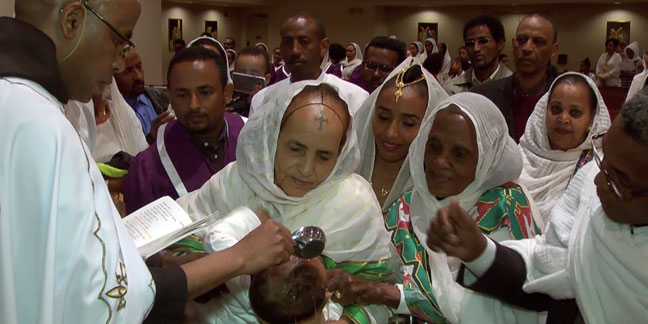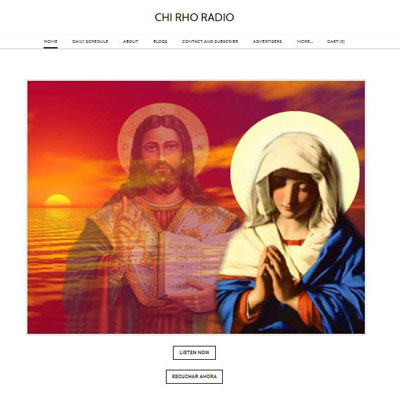 CHARLOTTE — They come from along the Red Sea, where their uniquely East African traditions blend with incense and the sounds of drums and Catholic prayers chanted in an ancient Semitic tongue.
CHARLOTTE — They come from along the Red Sea, where their uniquely East African traditions blend with incense and the sounds of drums and Catholic prayers chanted in an ancient Semitic tongue.
They are Eritrean Catholics, and they have found a home at St. Gabriel Church, where they meet monthly to celebrate the Divine Liturgy, or Mass.
About a hundred Eritrean Catholics gathered April 7 for their latest Eucharistic celebration, in which they commemorated Easter during a two-hour-long Mass in the Ge’ez rite, a liturgy rooted in the Church of Alexandria in Egypt. Men sat on the left side of the church, women on the right, wearing white robes covering their heads. Most of the Mass was chanted in Ge’ez, an ancient, dead language now used exclusively for liturgical celebrations.
The celebration was led by Father Kidanemariam Hadgu Gebrehiwot, who simply goes by Father Kidane. He travels from Atlanta every first Saturday of the month to offer Mass for the Eritrean Catholics in Charlotte, who number about 300.
Father Kidane comes from the Archeparchy (Archdiocese) of Asmara, Eritrea, the mother see of the Eritrean Catholic Church. The priest of 27 years serves at Corpus Christi Church in Stone Mountain, Ga., as well as serving as vicar for the Catholic Geez Rite community in the Atlanta area. Besides traveling regularly between Atlanta and Charlotte, he also ministers to Eritrean Catholics in Dallas, Texas.
Father Kidane says he is grateful to the Diocese of Charlotte and to St. Gabriel Parish for welcoming the Eritrean Catholics and helping them to practice their faith.
“We have felt very blessed and welcomed by all,” he says. “They have given us not only a space to celebrate, but also a space to share our culture.”
George Joseph, one of the organizers of the Eritrean community in Charlotte, arrived in 1992, shortly a border conflict erupted between Eritrea and Ethiopia. Like many of the immigrants, Joseph had to flee the region, which over several decades has been stricken by war, famine and drought. After earning a degree in finance from the University of North Carolina at Charlotte, he worked at several banks before establishing himself in the convenience store and real estate industries.
“I’ve been in Charlotte for 25 years. And I’ve seen years in which there was nothing to remind us where we were born. We had no leaders, no place to go,” Joseph recalls. Finally, after getting better organized, the local Eritreans sought help from the Archdiocese of Atlanta and began receiving visits from Father Kidane, who “for the community has been a blessing.”
“Our main objective is not to promote our rite, but to exercise our faith and be able to participate in the sacraments without any obstacle or restriction. This parish and the diocese have given us the opportunity we were looking for,” Joseph emphasizes.
Dawit Michael, who has lived in the United States for 10 years, adds, “One of the difficulties that immigrants have is finding a community that we feel part of, and the Church is one of those instruments of integration. At St. Gabriel they welcomed us, and here, in addition to the Mass, we program other activities for children and young people.”
Passing down the faith to their children and keeping young adults active in their faith is important, leaders say. At the April 7 Mass, the presence of many children and young adults was noticeable.
Erin Joseph, a student who was born in the United States to Eritrean immigrant parents, says he feels drawn to his Eritrean Catholic heritage and the Ge’ez rite liturgy. “I like it. It is very attractive. The music is different, more cheerful; people applaud. I feel very comfortable, like I’m in my own home.”
The opportunity to come together each month is about more than attending Mass, Joseph says. It’s about building community among what are mostly recent immigrants, many of whom work in convenience stores or drive taxis. The time spent in fellowship after Mass is important, he says, because “it is the way we meet, we greet each other, we see ourselves as a family.”
Father Kidane is hopeful about the prospects of the small but faith-filled Eritrean Catholic community in Charlotte. Perhaps, one day, they will be able to build a church of their own, but in the meantime, they appreciate the hospitality they have received from St. Gabriel Parish.
“Everything is in the hands of God,” he says.
— Cesar Hurtado, Hispanic Reporter
 FOREST CITY — There’s a new online Catholic radio station based in the Diocese of Charlotte and broadcasting in two languages.
FOREST CITY — There’s a new online Catholic radio station based in the Diocese of Charlotte and broadcasting in two languages.
The station www.chirhoradio.org streams local and national Catholic radio in English and Spanish, said Jim Brooks, parishioner of Immaculate Conception Church in Forest City and the station’s community programmer. The station launched in December, and it went live in Spanish earlier this month.
Born from the identified need for Catholic radio in the diocese, the station strives to educate, evangelize and provide entertainment, Brooks said.
The online radio station is a separate initiative from the Catholic Carolina Radio Network, which is in the process of developing a string of broadcast radio stations along the Interstate 85 corridor through the diocese.
After evaluating the costs involved with owning and broadcasting an over-the-air radio station, Brooks said he turned instead to streaming.
The online station is an affiliate of Light House Catholic Media and Ave Maria Radio. On Sundays, the station airs the “Swinging, Singing Deacon” with Deacon Andy Cilone of Immaculate Conception Church.
Sunday is the station’s most popular day, with up to 500 listeners an hour, Brook said. Currently, 80 percent of the audience is outside the diocese.
“Our goal is to celebrate and promote the faith. Our editorial guidelines is real simple: ‘Would Bishop (Fulton) Sheen play this?’ If it doesn’t fall under that category, it doesn’t get aired. It’s worked very, very well so far,” Brooks said.
Brooks said he would like to add full Latin Masses and homeschooling programs.
“We’re trying to find our footing on what programming works and what doesn’t,” he said. “It’s still trial and error. Audience feedback helps to decide what to run and when.”
The station is run by volunteers and funded by online subscriptions and advertising.
Brooks said he hopes as the station grows, it will be able to add additional language stations such as Korean and Vietnamese.
— Kimberly Bender, Online reporter
Listen online
At www.chirhoradio.org : Stream the station or download the app to stream it on your mobile device. You can also “subscribe” by donating $7 to help cover the station’s costs. For details, contact Jim Brooks at This email address is being protected from spambots. You need JavaScript enabled to view it..











